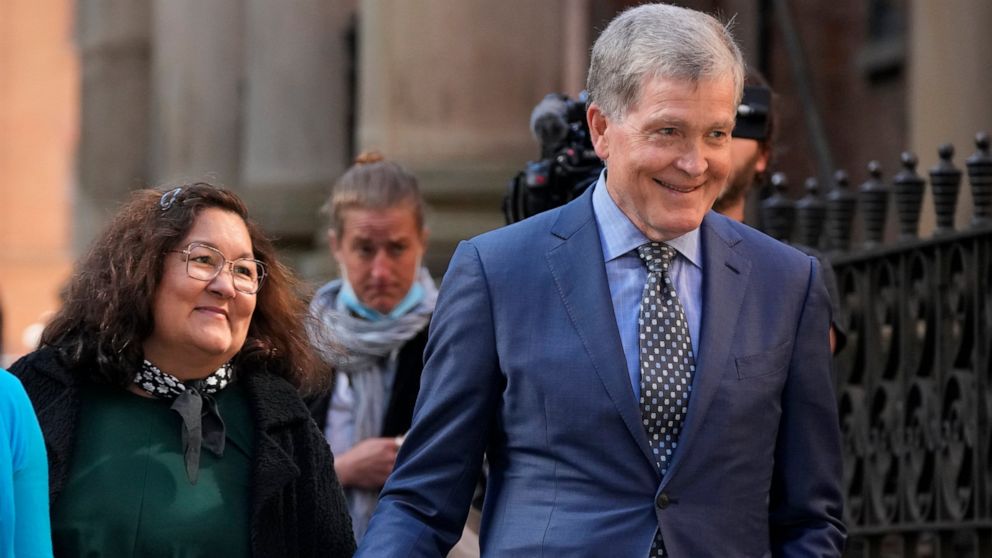TIJUANA —
The chords and notes from the Tijuana Gay Men’s Chorus spilled out from the basement of the red brick Casa de la Cultura and into the still night.
The immense border city was quieter than usual at this hour, following a recent wave of arson and cartel threats that had forced residents into hiding on a recent weekend night. But not on this block, where the 11-member vocal group belted out harmonies as part of their Wednesday night vocal technique class.
One of only two active gay men’s choruses in all of Mexico, the group aims to create a safe space for the artistic development of Tijuana’s gay and transgender community.
“This type of project in this city was more than necessary,” said Edgar Gheno, the director of the chorus. “Because we know that — or rather in my personal experience — not being who you are and not being able to express yourself generates problems …”
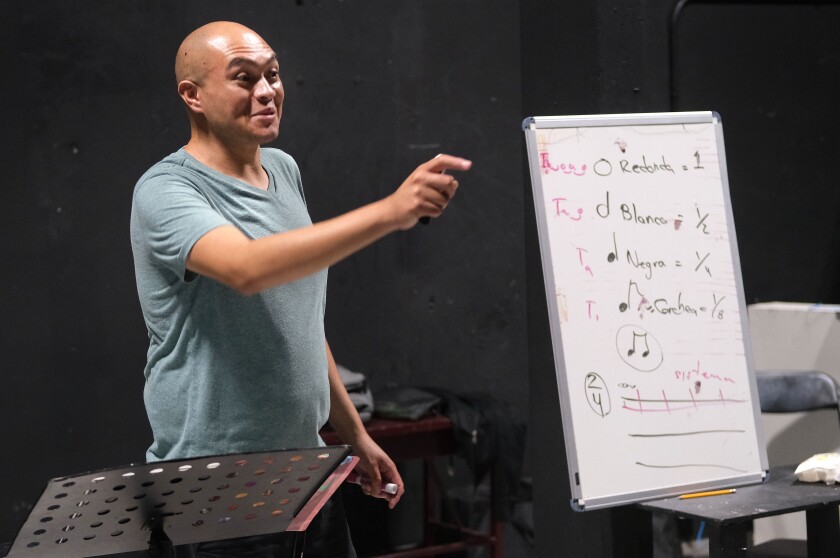
Chorus director Edgar Gheno leads rehearsal of the Tijuana Gay Men’s Chorus (Coro Gay de Tijuana) at the Casa de la Cultura on Aug. 24, 2022.
(David Maung/For The San Diego Union-Tribune)
But there is also a larger mission: to raise the profile of the LGBT community at a time when there have been advances and set-backs.
“What better way than through music to promote a message of respect, non-discrimination and tolerance,” explained Gheno, 36.
In some ways, LGBT rights have grown stronger in Mexico, with discrimination on the basis of sexual orientation outlawed since 2003. Most of the country’s 32 states recognize gay marriage, including Baja California, and the nation’s top court has ruled that trans people have a legal right to change their gender identity on official documents.
But the changes have been slow to come to the northern Mexican state of Baja California, where the Catholic religion is dominant and the right-leaning National Action Party, or PAN, has maintained some grip on the political landscape.
Locally, the legal right for same-sex couples to marry in Baja California has only been codified in the state constitution for one year, since August 2021. Before that, same-sex couples had to obtain a court order to marry because the constitution banned marriage for opposite sex couples.
It wasn’t until January that Baja California’s legislature passed a law that allows transgender adults to legally change their name and gender.
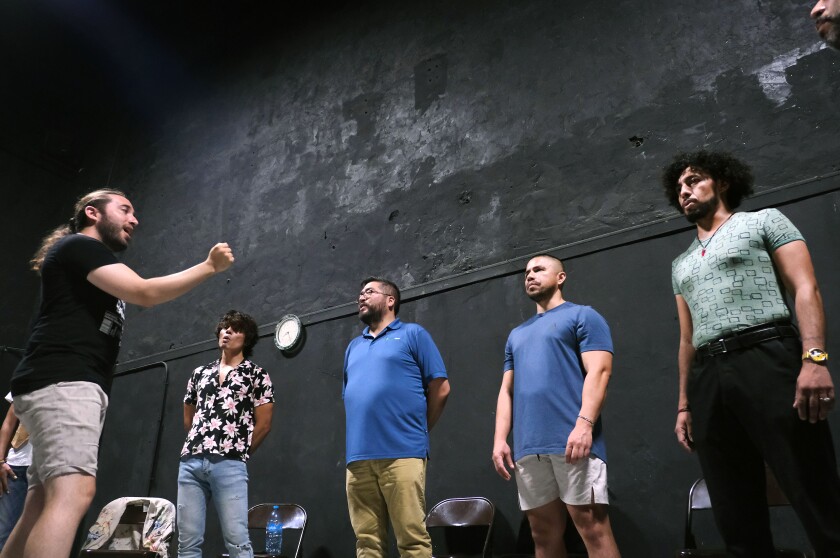
Vocal coach Israel Rodriguez, left, conducts a rehearsal focusing on vocal exercises.
(David Maung/For The San Diego Union-Tribune)
In April, the state’s legislature voted 20-4 in favor of banning conversion therapy, which aims to change a person’s sexual orientation. It is a practice that has been debunked; a 2007 task force convened by the American Psychological Association found no evidence it works. The bill would have levied fines and even jail time on anyone who practices it, as well as on parents who send their children to providers.
But Baja California Gov. Marina del Pilar Ávila Olmeda drew the ire of the gay community by vetoing it. She opted instead to regulate conversion therapy providers by allowing parents to make the choice to send their children to them — as long as the child is not forced into going.
Even though the LGBT rights movement has become stronger, broader and more visible across Mexico and in Baja California in recent years, advocates say there is still much work left to be done. In 2019, 117 lesbian, gay, bi-sexual and trans people were killed in Mexico, up almost a third compared with 2018 and the highest number since 2015, according to the LGBT+ advocacy group Letra S.
Francisco Madrid, a 36-year-old tenor who sings in the chorus, says the Tijuana Gay Men’s Chorus is aimed at music and art, but it is also helping overcome stigmas that are still prevalent in Tijuana about the gay community.
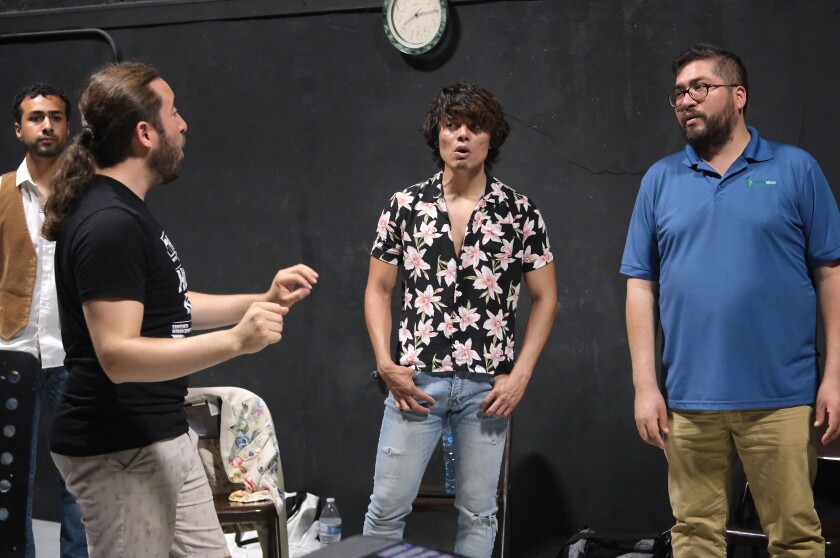
Tenors Francisco Madrid, center, and Jose Luis Bribiesca, right, follow instructions from vocal coach Israel Rodriguez.
(David Maung/For The San Diego Union-Tribune)
“Sometimes people think that we are just like running naked in the streets and going to parties every night and being crazy. But, we are actually very creative people and we are very talented people and we are showing that,” Madrid said, stepping aside during a recent vocal technique practice. “We are showing that music can remove the barriers between different ideologies.”
The group practices a couple times a week, and some of its members incorporate dance into their performances. They are scheduled to have a concert on Oct. 9 in Mexicali, with the performance tentatively scheduled to take place at the Central Library.
Many see singing as more than a hobby. Madrid said he’s been going on auditions and singing and dancing at performances for 20 years. “It’s a passion. It’s something I want to do with my life,” he explained.
At the recent Wednesday practice, the chorus warmed up with stretching and breath work. In one exercise, they each thought of a word in their head and then sang a note that they felt represented the word. At one point, the entire chorus seemed to blend their notes (and words) into one another, losing themselves briefly in the music.
The group started in March 2020, a week before the world shut down because of the coronavirus pandemic.
“The choir surviving two years during the pandemic was a miracle,” said Gheno.
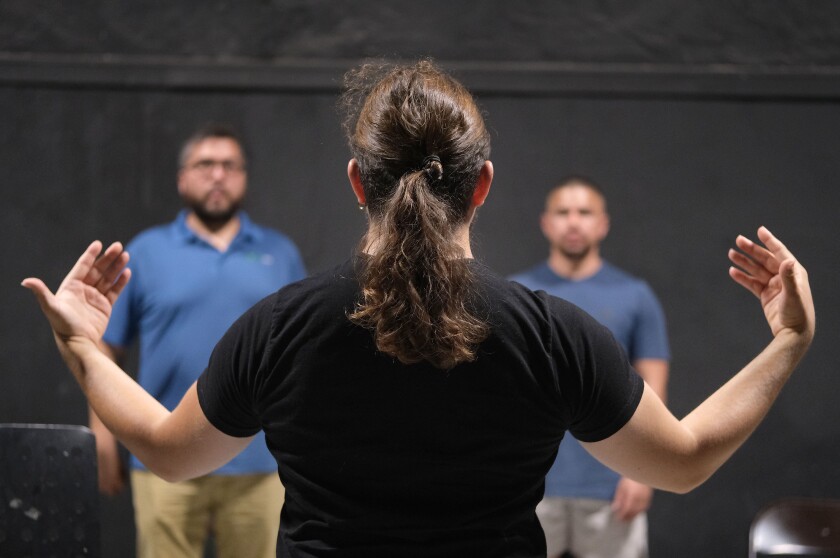
The chorus rehearses a few times a week.
(David Maung/For The San Diego Union-Tribune)
Charles Beale, the acclaimed new director of the San Diego Gay Men’s Chorus, which was founded in 1985, credits Gheno’s leadership.
“Edgar is a brave soul, an amazing educator and a pioneering leader, who has already done transforming work in building the Coro Gai TJ to where it is today, in a context which is not easy,” said Beale.
Both Gheno and Beale, directing gay men’s choruses 15 miles apart, recognize an opportunity for a possible cross-border collaboration.
“This is a time where international collaborations between Mexico and the U.S. could not be more crucial. We need to heal divisions sown by those with a narrow view of the world, and show how so much good can be achieved when we work together with our fellow man,” said Beale. “What better way to do that than by singing, which always brings joy and builds bonds between people.”
Gheno, Madrid and others in the chorus, said it feels uplifting to be doing something so positive at a time when most of the news out of the region is so dark.
“That’s the power of music,” said Madrid. “I mean every time that I feel sad or down — actually I play the guitar when I am stressed out, and I feel better. I would say the truth is that Mexico is not the safest place in the world, but I think there are a lot of good activities that you can find in TJ and this is one of them.”
Gheno added that idea is reflected in the group’s slogan: music, visibility and community, “because we also intend to create bonds or reinforce community ties through our music.”

Chorus members do warm-up exercises during a rehearsal.
(David Maung/For The San Diego Union-Tribune)








